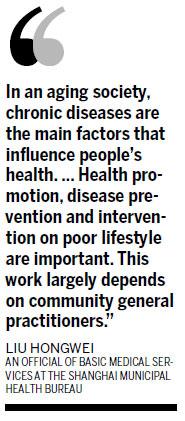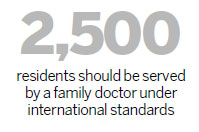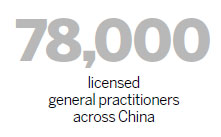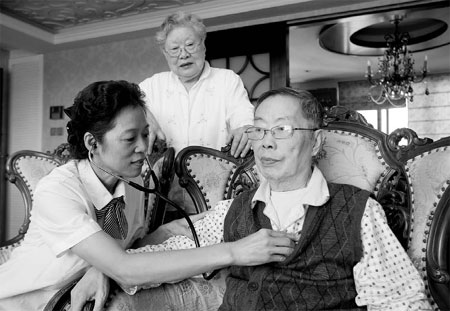Family doctors prove to be the right remedy
Updated: 2012-11-02 08:02
By Wang Hongyi in Shanghai (China Daily)
|
|||||||||
|
Chen Hua (left), a community doctor, gives an 84-year-old man a routine examination at the man's home in the Zhoujiaqiao community of Shanghai on Oct 12. Gao Erqiang / China Daily |

Shanghai leads the way in promoting community GPs
Mei Xingmei does not have to be asked twice why she has grown fond of her family doctor.
"They listen to me," the 64-year-old Shanghai resident said. "That's unheard of at a hospital - a doctor listening to a patient.
"There, you have to wait for hours, and when I finally see a doctor they are already writing a prescription before I've finished talking."
Mei, who has several medical conditions, including hypertension, is among the 2 million people citywide who have signed up with family doctors.
Shanghai took the lead in promoting the system in May 2011 when it introduced licensed general practitioners, or GPs, at community health centers in several districts. This allows residents to receive medical advice and treatment in or near their communities, easing the pressure on large, often overloaded hospitals.
Chinese people are used to going to hospitals for everything, from a serious illness to just a light cold. Mei said she no longer has to.
"Whenever I feel unwell, now I call my family doctor," she said. "The doctor regularly drops by to take my blood pressure and offer some guidance about my medication. That's good."
The Shanghai Municipal Health Bureau says residents are not charged when they sign up with a GP. All they pay is about 2 yuan ($0.30) each time they seek treatment at a community clinic and 15 yuan if they require a home visit.
Most of the medicines prescribed are also on the National Essential Drugs List and covered by insurance.
More than a year after launching the project, Shanghai now has 122 community medical service centers in 10 districts staffed by 2,000 family doctors, comprising 42 percent of all community doctors.
Liu Hongwei, who works in basic medical services for the municipal health bureau, said: "In an aging society, chronic diseases are the main factors that influence people's health. With this in mind, health promotion, disease prevention and intervention on poor lifestyle are important.
"This work largely depends on community GPs, allowing large hospitals to focus on giving patients more specific treatment," he said.
For many Chinese, visiting a hospital can be a laborious experience. They can wait for hours, be sent to various departments, and undergo a series of tests before a diagnosis.
The authorities say the family doctor system is aimed at putting convenient and personalized care within easy reach of residents, and could go some way to preventing conflicts between hospital doctors and patients.
Chen Hua, 54, began her career as a household registered doctor at Zhoujiaqiao Community Medical Service Center, in Changning district, in 2008.

She said going into communities, making regular house calls, providing guidance and establishing personalized health files are all part of her daily work.
"Unlike doctors at hospitals, people often doubt the ability of a community doctor," she said, adding that it took her a long time to win acceptance from the people in her area.
In addition to going from house to house to meet people, Chen provides free treatment and advice.
"I gradually built a good relationship with residents," she said. "Most now see me like a member of the family. They give me a call at any time."
A survey last year by Shanghai health authorities found more than 75 percent of residents support the idea of family doctors.

Liu, in basic medical services, said: "It's understandable people put more trust in large hospitals. It will take time for them to change their mind and accept (the GP) system."
Obvious differences
But the income of family doctors like Chen does not appear to be attractive.
China Daily reporters visited several community medical service centers and found differences between the income of community-based family doctors and those in large hospitals.
The monthly income of a family doctor is 4,000 to 5,000 yuan - half the amount a doctor at a large hospital earns.
"The low income is not good for attracting doctors to work in communities," said Xiao Feng, deputy director of the Zhoujiaqiao medical services center.
More than 400 families have signed contracts with Chen, and her efforts are being promoted at other clinics by authorities.
In many communities, more than 80 percent of residents have signed with family doctors, the Shanghai health department says. But one problem is there are not enough GPs to cope.
Under international standards, a family doctor should serve 2,500 residents, or 800 to 1,000 families. But to achieve this in Shanghai, the city needs 4,000 more physicians, Liu said.
The shortage is also a problem in other cities that have launched similar programs, including Yantai in Shandong province and Taiyuan in Shanxi province.
Across China there are only about 78,000 licensed GPs, according to the Ministry of Health.
To solve the problem, Shanghai plans to launch a medical training system for GPs, which integrates training centers, clinical bases and community bases. The target is to produce 500 new GPs a year, Liu said.
A GP training program and free education for medical students are initiatives that will help boost China's medical services in the countryside, Vice-Minister of Health Zhang Mao said in an interview with Xinhua News Agency on Thursday.
China's GP program consists of five years of training in a medical school and three years of clinical GP training.
In July 2011, the State Council issued guidance for setting up a GP system, requiring the 50,000-plus basic medical service agencies nationwide to have a certain number of GPs.
Meanwhile, medical workers are being encouraged to work at community centers. The guidance states that the goal is to have two or three GPs for every 10,000 residents by 2020.
wanghongyi@chinadaily.com.cn
(China Daily 11/02/2012 page4)

 Relief reaches isolated village
Relief reaches isolated village
 Rainfall poses new threats to quake-hit region
Rainfall poses new threats to quake-hit region
 Funerals begin for Boston bombing victims
Funerals begin for Boston bombing victims
 Quake takeaway from China's Air Force
Quake takeaway from China's Air Force
 Obama celebrates young inventors at science fair
Obama celebrates young inventors at science fair
 Earth Day marked around the world
Earth Day marked around the world
 Volunteer team helping students find sense of normalcy
Volunteer team helping students find sense of normalcy
 Ethnic groups quick to join rescue efforts
Ethnic groups quick to join rescue efforts
Most Viewed
Editor's Picks

|

|

|

|

|

|
Today's Top News
Health new priority for quake zone
Xi meets US top military officer
Japan's boats driven out of Diaoyu
China mulls online shopping legislation
Bird flu death toll rises to 22
Putin appoints new ambassador to China
Japanese ships blocked from Diaoyu Islands
Inspired by Guan, more Chinese pick up golf
US Weekly

|

|








